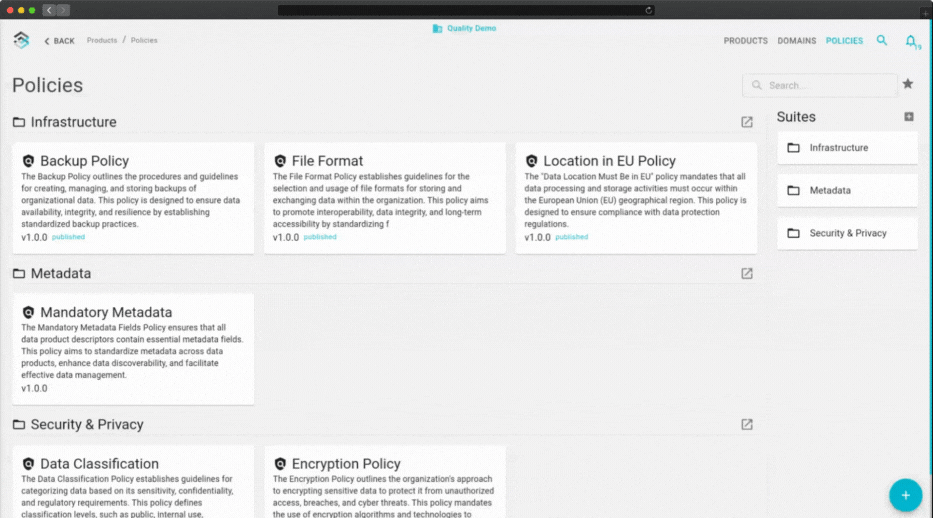Overview
In the context of self-serve data platforms and the increasing focus on embedding governance early in the data lifecycle, federated computational governance has emerged as a prominent solution.
At Blindata, we’ve embraced this concept, integrating it seamlessly into our platform to establish a quality gateway for ensuring integrity, security, and compliance throughout the data product lifecycle. Our goal is to foster trust and reliability in decentralized data environments, enabling organizations to control and oversee governance processes at every stage.
Key aspects of federated computational governance with Blindata include:
Variety
Blindata supports a wide range of governance policies, ranging from documentation of best practices to computational policies expressed as code.
Automation
Blindata’s platform enables the implementation of automated governance policies, encompassing various policy languages and models.
Efficiency
Automated policies ensure swift data verification and agile response to changes, enhancing efficiency and scalability.
Standardization
Automated enforcement ensures consistent policy application across all data products. This standardized approach enhances reliability and facilitates streamlined governance processes.
Transparency and Trust
Blindata fosters transparency and trust by providing clear visibility into governance practices. Stakeholders can easily understand and verify governance policies.
Features
The Blindata platform provides an extensive array of features designed to empower organizations seeking to implement federated computational governance.
-
Policy Documentation and Management: Blindata serves as the centralized hub for organizing and exploring policies. It provides a set of tools within its policies repository to streamline policy documentation, purposes and requirements definition, implementation, result gathering, non-compliance management, and assessment.
-
Adoption Tracking: Blindata facilitates policy adoption, enabling users to integrate guidelines seamlessly and track adoption progress through intuitive visual elements and dashboards.
-
Evaluation Logs: Track the validation process of policies on specific data products, ensuring compliance with defined rules and guidelines within Blindata’s platform.
-
Policy as Code: Utilize Blindata as an implementation registry for automated policies, efficiently managing and organizing policy implementations.
-
Issue Management & Collaboration: Blindata detects potential violations and notifies data owners, providing a collaborative platform for resolving issues efficiently across teams and channels. Integrated issue management features allow for feedback, collaboration, and incident tracking with ease.
How To
Implementing federated computational governance with Blindata is a streamlined process, empowering organizations to enforce policies, ensure compliance, and optimize decision-making across their data ecosystem.
Identify key objectives and requirements for your organization’s governance framework, encompassing various policy types such as:
- Documentation and Metadata Policies: Specify metadata requirements and guidelines for documenting assets to standardize metadata across data products, enhance data discoverability, and facilitate effective data management.
- Compliance and Privacy Policies: Define sensitive data formats, ensure proper labeling, and establish categorization guidelines based on sensitivity, confidentiality, and regulatory compliance.
- Security Policies: Determine who can access what data. Outline the organization’s approach to encrypting sensitive data to protect it from unauthorized access, breaches, and cyber threats.
- Infrastrucutre Policies: Ensure regulatory compliance for data storage locations, maintain data availability, integrity, and resilience through standardized backup practices, and enhance interoperability and long-term accessibility by standardizing file formats for data storage and exchange within the organization.
This flexibility allows organizations to tailor policies to their specific needs and ensure effective data management throughout the data products’ lifecycle.
Embed governance policies into the lifecycle of data products. This includes validation of data product descriptors and contracts, deployment validation, and monitoring compliance throughout stages such as the creation or update of a data product, the transition of data products between different stages and environments, the deployment of the data product to the designated environment.
These processes can be implemented as custom solutions or leveraged through the Open Data Mesh Platform (ODM). ODM serves as a central quality gateway and control plane for managing distributed data architecture, facilitating efficient policy enforcement and governance across data products.




